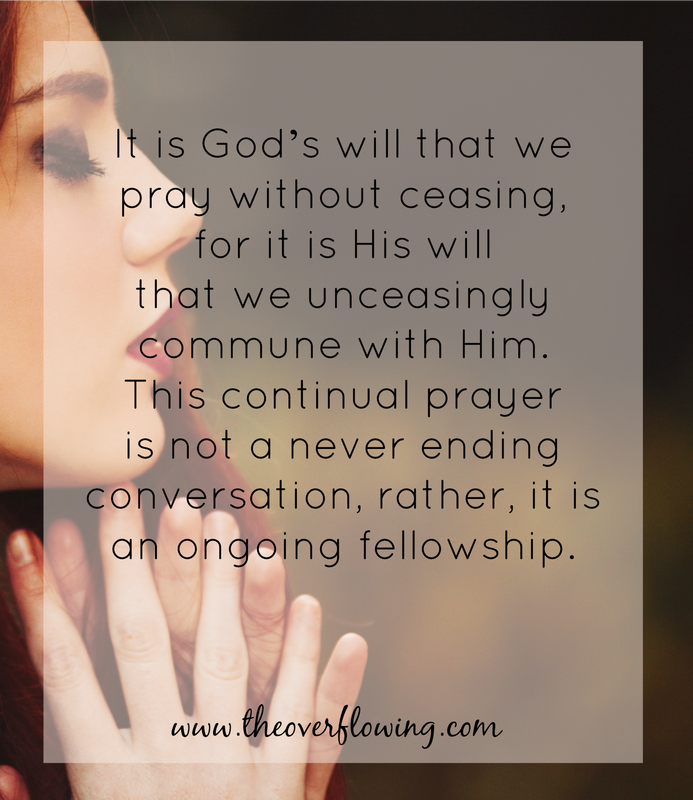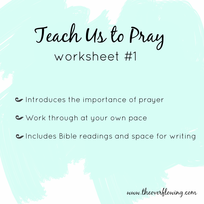|
Prayer.
It is one of the pillars of our relationship with God (Acts 2:42). And what a beautiful pillar it is. To think, Creator God, Almighty God, Sovereign God would gift us with so intimate a form of communication with Him. The privilege to submit our requests to Him, to pray for healing, the joy of rejoicing with prayers of thanksgiving. And that promise that He listens, that He accepts, that He is attentive. We have a mediator, Jesus Christ, who intercedes on our behalf, and so we are to pray (1 Timothy 2:1-8). By Jesus’ intercession, relationship with God is made possible, and prayer is made powerful, superseding the physical, unleashing the divine. “The prayer of a righteous person is powerful and effective. Elijah was a human being, even as we are. He prayed earnestly that it would not rain, and it did not rain on the land for three and a half years. Again he prayed, and the heavens gave rain, and the earth produced its crops.” (James 5:16-18) So I wonder, do we fully unwrap this gift? For we are to pray without ceasing (1 Thessalonians 5:17). Continual prayer. Always praying, no matter when, no matter where. Prayer is not something we take lightly or do lackadaisically. We are to be faithful in prayer and pray with alertness and devotion (Romans 12:12, 1 Peter 4:7, Colossians 4:2). We are to pray with faith (James 5:15), placing trust in the One to whom we pray, the One who hears and works. But oftentimes, I find myself asking, “How?” How am I to pray constantly? What does that even mean? How can I keep faith when doubts scream? How can I be faithful and alert when distractions pull? What does submitting requests and praying for healing and for other people look like in my life? How does it affect my life? I’ve been told that prayer is just having a conversation with God; you can talk to Him like you would a friend. And while to some extent I agree with this, I also feel we sell the power of prayer short with this “definition”. Is prayer really just conversing with God? Because we can talk. We can converse. We do this with friends and acquaintances and even people we don’t really like all the time. Yet talk can be shallow. Conversation can be platonic. And those are not words I want to be used when describing my relationship with God, my conversing with Him. I don’t want to be “just friends” with God. He is much too immense for that. There must be more to our interacting than conversation. There must be more to prayer than mere talk. In Luke 11, one of Jesus’ disciples asked Him to teach them to pray. Jesus responded to the request with a “model” for prayer; what is now known as “The Lord’s Prayer”. And in this answering from Jesus, it is taught that prayer truly is more than talk, more than conversing with God (though it is also that). So over the next few weeks, I’ll be writing from this prayer, that we may learn to pray in such a way that our lives go beyond talk. But before we journey through the prayer, let’s take a closer look at the disciples request: A question comes to mind: why this asking for teaching on prayer? I would not think prayer would be a foreign concept to the disciples. Whether Jewish or Gentile, religion and communicating with the gods would have been a prominent part of culture. So why not a request to be taught to perform miracles, or how to teach with authority? Those seem the more impressive feats. Leading up to the disciple’s request, Luke 11:1 says, “One day, Jesus was praying in a certain place. When He finished, one of His disciple said to Him, ‘Lord, teach us to pray…’” Prior to this interaction, Jesus “often withdrew to lonely places and prayed” (Luke 5:16). The disciples saw in Jesus’ life the importance of prayer, of communing with God. They seemed to understand that this fellowship with the Father was at the core of who Jesus was while He walked the earth. And for Jesus, this fellowship went beyond talk. For He said in John 5:19, “I can do nothing by Myself; I can only do what I see My Father doing, because what My Father does, I also do.” And again in John 5:30, “By Myself I can do nothing. I judge only as I hear, and my judgement is just, for I seek not to please Myself but Him who sent Me.” Jesus very actions and thinking and speaking, the miracles He performed and the teaching He spoke, came from His communion with God. The word translated to “prayer” in Luke 11, is the Greek proseuchomai. This word can be broken up further, into two other Greek words, pros and euchomai. Pros is a preposition of direction, and it means “forward to” or “toward”; it is a strengthened form of the Greek pro, which means “above” or “prior”. Euchomai simply means, “to pray to God.” So proseuchomai is a moving toward in prayer. It is a moving forward in prayer. In this word, there is action that goes beyond the mere speaking of words. There is a going deeper, a growth in the communion. And the pro, or “above” and “prior”, implies prayer as a first course of action, and of high importance. As Oswald Chambers said, “Prayer does not fit us for the greater work; prayer is the greater work.” And, "We tend to use prayer as a last resort, but God wants it to be our first line of defense. We pray when there's nothing else we can do, but God wants us to pray before we do anything at all." The disciples were not just asking, “How do I converse with God?” but “How do I enter into fellowship with God? How do I move toward God, coming closer to Him? How do I go deeper and grow?” In all my questions on prayer, that’s really the heart of it. How do I pray in such a way as to deepen my relationship with God and grow in my walking with Him? It is God’s will that we pray without ceasing, for it is His will that we unceasingly commune with Him (1 Thessalonians 5:17). This continual prayer is not a never ending conversation, rather, it is an ongoing fellowship. A constant submitting and deepening and learning and growing and overflowing. “I pray because the need flows out of me all the time - waking and sleeping. It doesn’t change God - it changes me.” - C.S. Lewis
The post Teach Us to Pray first appeared on The Overflowing
Photo from SplitShire, edited by Jessica Faith All Scriptures taken from the NIV Greek origins and definitions from Strong's Expanded Exhaustive Concordance of the Bible by James Strong, Copyright 2010
0 Comments
Leave a Reply. |
|





